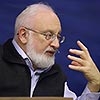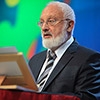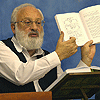Audio Version Of The Blog – 12/25/22
Listen to an Audio Version of the Blog
Download:MP3 Audio

Listen to an Audio Version of the Blog
Download:MP3 Audio
 “Because the will to receive is not in our root, we feel shame and intolerance in it. Our sages wrote that in order to correct this, He has “prepared” for us labor in Torah and Mitzvot in this world, to invert the will to receive into a desire to bestow” (Baal HaSulam, The Study of the Ten Sefirot, Part 1, “Inner Observation,” Chapter 4, Item 20).
“Because the will to receive is not in our root, we feel shame and intolerance in it. Our sages wrote that in order to correct this, He has “prepared” for us labor in Torah and Mitzvot in this world, to invert the will to receive into a desire to bestow” (Baal HaSulam, The Study of the Ten Sefirot, Part 1, “Inner Observation,” Chapter 4, Item 20).
Everything that is not included in the desire to enjoy causes us impatience and difficulties. All this does not exist in the Creator; therefore, it is perceived by us as undesirable. And we suffer from this.
Question: Does it mean that we feel shame and intolerance because this does not exist in our root?
Answer: Yes. By feeling our dissimilarity to the Creator, we, accordingly, experience negative feelings.
[306475]
From KabTV’s “The Study of the Ten Sefirot (TES)” 12/4/22
Related Material:
Shame As The Means Of Correction
All Pleasures Are in the Creator
Branches Extending from Infinity
 The need and necessity for the long cascading to this world will be explained below, that this great labor of turning the form of reception into the form of bestowal can only be conceived in this world (Baal HaSulam, The Study of the Ten Sefirot, Part 1, “Inner Observation,” Chapter 4, Item 20).
The need and necessity for the long cascading to this world will be explained below, that this great labor of turning the form of reception into the form of bestowal can only be conceived in this world (Baal HaSulam, The Study of the Ten Sefirot, Part 1, “Inner Observation,” Chapter 4, Item 20).
Question: What is this state called our world, and how come the form of bestowal can only be acquired from it?
Answer: On one hand our world is the lowest of the worlds; it is very distant from the qualities of the Creator, the qualities of bestowal, and exists completely in the quality of reception. On the other hand, by using a mechanism called the Torah, that is, the upper light, which comes to us and makes it possible to acquire the quality of bestowal, we can gradually rise from the quality of reception to the quality of bestowal and thus come closer to the Creator.
Question: But why specifically from the state of our world? What is so special about it?
Answer: Our world is opposite to the upper world, opposite to the Creator. While we exist in it, we can act the way the quality of reception dictates to us. Then, gradually we acquire also the qualities of bestowal. First, we acquire the quality of receiving in order to receive, and then receiving in order to bestow. Thus, we become equivalent to the Creator.
Our world is a special state where we exist only in reception, initially not understanding what real, absolute bestowal is. It is from the opposite state that we can understand what it is. But first we need to fully understand what reception is.
[306603]
From KabTV’s “The Study of the Ten Sefirot (TES)” 12/4/22
Related Material:
Why Does Our World Exist?
Our World Is A Point Of Spiritual Ascent
Is There Love In Our World?
 Question: What was your attitude toward Rabash? Was it as a son to a father, that he is a close, dear person to you? Or was it more a feeling that over the years of study you must take everything from him to pass on? What prevailed: the attitude of the son to the father or the student to the teacher?
Question: What was your attitude toward Rabash? Was it as a son to a father, that he is a close, dear person to you? Or was it more a feeling that over the years of study you must take everything from him to pass on? What prevailed: the attitude of the son to the father or the student to the teacher?
Answer: Of course, the son. There was a very serious, very clear sense of relationship between us. He felt that my house was his home. My wife cooked for him, washed his clothes, and knitted things for him. It was a very close relationship.
When I first came to him, one evening before classes I saw that his students were passing a letter of Baal HaSulam from hand to hand. It was an article that was later included in the collection “Shamati.”
When I asked him, “Where do I get it and how do I understand it?”, he replied: “The most important thing for you is to achieve the study of “peh el peh” (mouth to mouth).”
For a long time I didn’t understand what these words meant. That is, I heard that this is supposedly a state of study, but I didn’t know what it was, what it is like. Later I realized that “peh el peh” is a single soul when a student adapts to the teacher in everything.
It is very difficult to come to this because there are huge counter forces. It is not just like in a calm atmosphere—we are together and that is it. This is working against huge interference
[306505]
From KabTV’s “Secrets of the Eternal Book” 2/12/10
Related Material:
How To Start Hearing The Teacher
Annulment Of The Student Before The Teacher
Who Is Closer To The Teacher?
 Question: Any book leaves a person with a set of impressions. As one reads, a person’s imagination soars and depicts all kinds of things.
Question: Any book leaves a person with a set of impressions. As one reads, a person’s imagination soars and depicts all kinds of things.
You said Kabbalistic books leave the same impression on different people. Did I understand correctly that they give such a clear imprint of certain states that fantasy has no place here?
Answer: Of course not. On the contrary, when a person begins to study Kabbalah all sorts of fantasies gradually disappear, a person becomes very grounded, engages in science, and understands that he exists in a system of forces, and he needs to learn to interact with them.
The more we advance and study man, the less we fantasize. What fantasies?! These are all kinds of electric fields in our brain that affect our biological forms. At the same time, some chemicals get released that also interact with each other, and so on.
That is, there are no feelings. There will be feelings, but only when they become independent of matter. After all, being given something to smell, for example, will produce certain sensations. This shows how much our feelings depend on the processes that occur in us.
While we must rise above these processes with pure logic. Pure logic—after the restriction (screen and reflected light), when I come into contact with the one upper force, with all my strength and scrutiny, and start working together with it on the basis called Zivug de haka’a (coupling).
On one hand, the coupling is a rejection because I reject my ego, but do not discard it, I do not destroy it, but simply push it away to connect with the upper force. And to the extent that I can include my ego, that is, my correctly aimed desires, I include them.
This is a very exact science, there are no sentiments in Kabbalah. It contains precise laws, formulas, forces, and their mutual rapprochement and distancing, and how by connecting with each other at different levels, they form all kinds of shapes: right and left lines. This way, certain feelings are evoked but only to control this process.
We rise from one sensation to another until we begin to feel the Creator. But all these feelings are not in us, not in our ego, but in the quality of bestowal that we develop in ourselves. It is an upper reasoning that is not based on our feelings because feelings come after reason.
First, the mind evolves, which develops self-control, understanding of all actions, and only after that does a feeling from you emerge. This is a completely different level of existence—beyond our present nature.
[306173]
From KabTV’s “I Got a Call. Recommended Books” 12/12/13
Related Material:
Mind And Feelings In Spiritual Development
The Mind Only Evaluates Feelings
Playing With Sensations
 Question: How can students ask questions so as not to distract everyone from the lesson?
Question: How can students ask questions so as not to distract everyone from the lesson?
Answer: Students should ask on the topic, what they are desperate for, and for more clarification about the material we are studying. Moreover, asking questions is optional when they need to clarify something.
Even if they do not have such an urgent need, but they understand that this question is now appropriate, then they should ask.
And it will help me to explain. Maybe I myself did not feel that it was necessary to scrutinize more here. We have to work together.
[306600]
From KabTV’s “I Got a Call. Ask a Kabbalist a Question” 3/6/13
Related Material:
What Is A “Question” in Spirituality?
The Meaning Of Life: The Question That Cannot Be Avoided
The Source Of All Questions
 Comment: Let’s say you start a dialogue with a student and can talk with him for an hour. You say that this is for the benefit of the group.
Comment: Let’s say you start a dialogue with a student and can talk with him for an hour. You say that this is for the benefit of the group.
My Response: It is not him I am talking to. What does he have to do with it? He only awakens this topic, this desire, but this is not he himself, and I am, in a way, answering not to him.
I am talking about the group, about the Creator, about the world, about correction, connection, integrity, and about the way to bring it all to one common system in which the entire universe will be revealed to all of humanity. What does the student have to do with it? It is just that the required awakening came through him, and he voiced a question to which I should give an answer.
I do not look at the student at all. Through him, a question comes to me from somewhere, from the general thought of creation, from the common system. I now need to adjust this system a little, to twist a couple of resistors, a capacitor, a coil, an oscillating circuit, and make some adjustments. This is what I am doing.
[306549]
From KabTV’s “I Got a Call. Ask a Kabbalist a Question” 12/21/13
Related Material:
Along the Same Chain
Annulment Of The Student Before The Teacher
How To Start Hearing The Teacher
Preparation to the Lesson
| [media 1] | [media 2] |
Zohar for All “Introduction to The Book of Zohar,” “The Letter of Rav Hamnuna Saba”
| [media 3] | [media 4] |
Writings of Baal HaSulam “Introduction to The Book of Zohar”
| [media 5] | [media 6] |
Selected Highlights
| [media 7] | [media 8] |